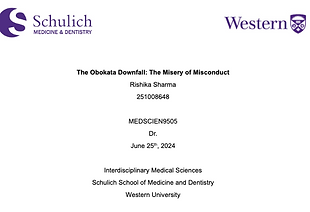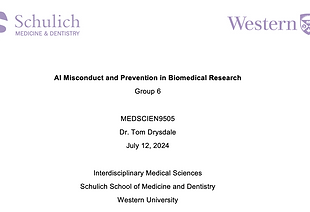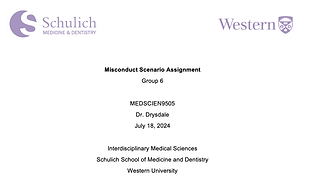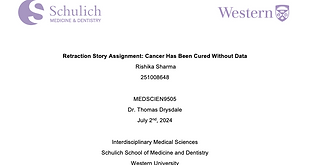Academic Integrity & Professionalism
M.Sc Interdisciplinary Medical Science 9505
Course Description As Taken From Syllabus:
This course will look at ethics and academic integrity in research. We will openly discuss what constitutes ethical behaviour and the implications of academic misconduct. Students will explore the importance of doing research in an ethical manner and how to establish an environment that supports that behaviour. Despite the importance of doing ethical research, evidence strongly suggests that misconduct is not particularly rare and often overlooked. The students will discuss multiple examples of ethical lapses and motivations that might drive misconduct. Ethical conduct in experimentation, animal studies, human studies, publishing, and collaborations will be specifically detailed including emerging threats such as predatory journals. The goal of the course will be to identify ethical issues early and develop mechanisms that ensure exemplary research.
Learning Objectives:
-
Apply academic integrity principles within your course discussions and throughout your program rotations
-
Develop a thorough understanding of professionalism in multiple professional settings
-
Evaluate red flags and learn how to prevent academic and professional misconduct
Course Artifacts
These are some of the works I have produced in this course. Click on the button to view the entire project!

In this assignment, I conducted a thorough analysis of the Obokata case, examining it through the lens of ethics, scientific misconduct, and the various pressures that can lead to unethical behavior in research. I explored the different perspectives involved, including the roles of the researcher, the institution, and the broader scientific community. My analysis focused on identifying the key ethical breaches, understanding the motivations and pressures that contributed to the misconduct, and reflecting on the implications for the integrity of scientific research. This assignment allowed me to critically evaluate the complex factors that can compromise ethical standards in research.

In this group assignment, we analyzed AI misconduct in biomedical research by exploring novel methods to exploit AI systems and identifying potential ways researchers might use AI to cheat. We delved into various cheating techniques, which allowed us to understand the vulnerabilities and ethical challenges associated with AI in research. Through this process, we developed strategies to mitigate these risks and enhance the integrity of AI-driven research. This assignment provided valuable insights into the complexities and nuances of using AI in biomedical research, emphasizing the importance of robust ethical guidelines and oversight.

In this assignment, we were presented with a sensitive ethical scenario involving a historically marginalized Indigenous community. The focus was on how to navigate a situation where an Indigenous Elder approached our research team with a specific concern affecting their community. We examined the ethical considerations, emphasizing the importance of cultural sensitivity, respect for Indigenous knowledge, and the need for collaborative and community-centered approaches in addressing the concern. This assignment highlighted the complexities of conducting research within Indigenous communities, teaching us the critical importance of trust, communication, and ethical responsibility in such contexts.

In this assignment, I used the Retraction Watch platform to examine articles flagged for scientific misconduct. I selected a specific paper and conducted a thorough analysis of the case, focusing on the ethical boundaries that were crossed, the underlying causes of the misconduct, and the responses from the research community. My analysis delved into the implications of the misconduct on the scientific field, the credibility of the research, and the broader impact on public trust. This assignment provided valuable insights into the importance of maintaining ethical standards in research and the consequences of failing to do so.
Reflection
Reflecting on the academic integrity, ethical, and professional assignments, I recognize how they have deepened my understanding of the critical role these principles play in research and professional practice. Engaging with cases of scientific misconduct, navigating ethical dilemmas, and developing solutions for equity and inclusion has reinforced my commitment to maintaining high standards of integrity and professionalism.
These assignments provided me with valuable insights into the complexities of ethical decision-making and the importance of transparent and responsible research practices. Analyzing real-world scenarios and proposing actionable solutions highlighted the need for vigilance and proactive measures to address potential misconduct and ensure ethical compliance. Overall, these experiences have strengthened my resolve to uphold the highest standards of academic and professional integrity in my future work.
